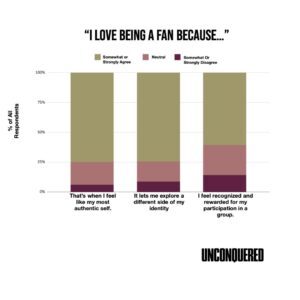Thought Leadership
When Marketing To Fans, Don’t Treat Them Like A Segment

Fandom activates our need to be a part of something larger than ourselves, while simultaneously deepening our sense of individuality so marketing to fans requires a different mind set. It’s something that we saw in our experience in the sports and athletic apparel space, but isn’t limited to just that vertical. The thread that ties brands, sports and entertainment fandoms, is the simple instinct to connect with likeminded people around things you love.
Social identity theory tells us that we establish our personal and emotional identity within the context of a group. People become fans in spaces where they are allowed to express their passions as themselves. Jeanie Stewart, senior consultant with the Neuroleadership Institute said, “When we share a sense of social identity with a group, we can lean in, use our strengths and be authentically who we are.”
Through our own research for Decoding Fandom, we have found that when you invite fans to consider their fandom in the context of their interests and passions, they get excited. But when you force them to think of themselves as “fans” in terms you’ve pre-defined, they lose their spark. That’s because fandom is deeply personal, and people want to decide when and how they are fans, rather than have it imposed upon them as a label. We see this disconnect reflected in our data. When they consider what it feels like to be a fan, they are much more likely to see it as an extension of who they are, rather than a discrete behavior or membership in a group. That’s why it’s critical to avoid treating them like a segment or a target.
When brands are marketing to fans in a tone that they think they should be spoken to, it’s often in a capitalistic one that stems from the minds of marketers with visions of KPIs. This is at direct odds with how fan’s speak which comes from a place of love. Take for example the backlash Netflix faced for its Stranger Things NFT campaign. In Allegra Rosenberg’s piece, Do Fans Actually Want to Monetize, she astutely says, “Instead of fans eagerly lining up to own a unique token that signified blockchain ownership of one of five character posters, they roundly called bullshit and left participation in the campaign mainly to non-fan NFT enthusiasts.” This is a great example of a very strong, passionate fanbase saying that they can not be tempted with things like “exclusivity” and “ownership”. These concepts only serve to sow distrust among the very fans they mean to engage.
Thinking of fans as segments also ignores the inherent group diversity that rally around a shared passion. This deep passion is what binds them and is the key to the fandom’s success. What do we mean by deep passion? Simply put, deep passion is that feeling when your heart overtakes your head. It’s the thing that makes sports fans bare their painted chests in freezing weather and sneakerheads camp out overnight for the latest drop. And it’s not just for superfans among us. Everyone has the potential to become deeply passionate when the circumstances are right.
What it all boils down to for us as an agency: everything we do should inspire deep passion for our clients and their brands. Call it our agency KPI. For us, irrational passion is our starting point, the thing we aspire to create in all of our work. And we do this by connecting the building blocks of fandom together which means we identify a shared purpose, fuel it with compelling stories, which add value inside of meaningful spaces while embracing community co-creation.
Curious how marketing to your fans can help your brand? Schedule a time to chat.
- Posted In
Thought Leadership